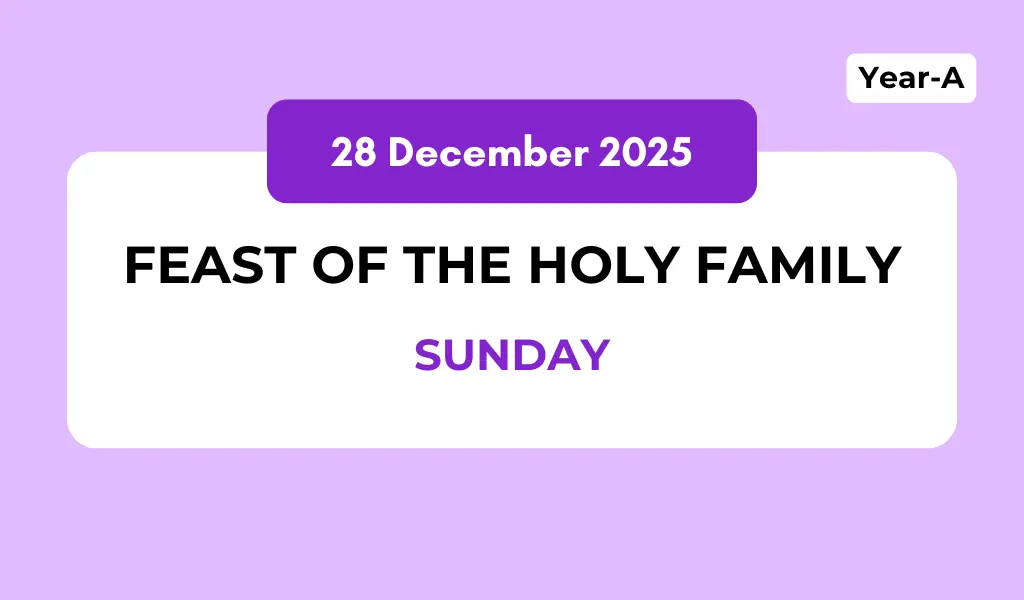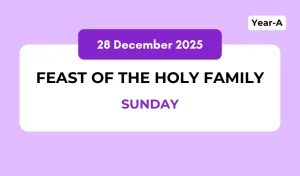Catholic Mass Readings and Reflection August 25, 2024
Twenty-First Week of Ordinary Time
25th August 2024 (Sunday)
Psalter: Week 1
Reading of the Day
First Reading: Joshua 24:1-2a, 15-17, 18b
In those days: Joshua gathered all the tribes of Israel to Shechem and summoned the elders, the heads, the judges, and the officers of Israel. And they presented themselves before God. And Joshua said to all people, “If it is evil in your eyes to serve the Lord, choose this day whom you will serve, whether the gods your fathers served in the region beyond the River, or the gods of the Amorites in whose land you dwell. But as for me and my house, we will serve the Lord.” Then the people answered, “Far be it from us that we should forsake the Lord to serve other gods, for it is the Lord our God who brought us and our fathers up from the land of Egypt, out of the house of slavery, and who did those great signs in our sight and preserved us in all the way that we went, and among all the peoples through whom we passed. Therefore we also will serve the Lord, for he is our God.”
Psalm 34:2-3, 16-17, 18-19, 20-21, 22-23 (R. 9a)
R/. Taste and see that the Lord is good
Second Reading: Ephesians 5:21-32
Brethren: Submit to one another out of reverence for Christ. Wives, submit to your own husbands, as to the Lord. For the husband is the head of the wife even as Christ is the head of the church, his body, and is himself its Saviour. Now as the church submits to Christ, so also wives should submit in everything to their husbands. Husbands, love your wives, as Christ loved the church and gave himself up for her, that he might sanctify her, having cleansed her by the washing of water with the word, so that he might present the church to himself in splendour, without spot or wrinkle or any such thing, that she might be holy and without blemish. In the same way husbands should love their wives as their own bodies. He who loves his wife loves himself. For no one ever hated his own flesh, but nourishes and cherishes it, just as Christ does the church, because we are members of his body. “Therefore a man shall leave his father and mother and hold fast to his wife, and the two shall become one flesh.” This mystery is profound, and I am saying that it refers to Christ and the church.
Gospel Acclamation
V/. Alleluia
R/. Alleluia
V/. Your words, Lord, are Spirit and life; you have the words of eternal life.
R/. Alleluia.
Gospel : John 6:60-69
At that time: Many of the disciples of Jesus said, “This is a hard saying; who can listen to it?” But Jesus, knowing in himself that his disciples were grumbling about this, said to them, “Do you take offense at this? Then what if you were to see the Son of Man ascending to where he was before? It is the Spirit who gives life; the flesh is no help at all. The words that I have spoken to you are spirit and life. But there are some of you who do not believe.” (For Jesus knew from the beginning who those were who did not believe, and who it was who would betray him.) And he said, “This is why I told you that no one can come to me unless it is granted him by the Father.” After this many of his disciples turned back and no longer walked with him. So Jesus said to the twelve, “Do you want to go away as well?” Simon Peter answered him, “Lord, to whom shall we go? You have the words of eternal life, and we have believed, and have come to know, that you are the Holy One of God.”
Daily Gospel Reflection
Sunday – Twenty-First Sunday of Ordinary Time
Guidelines: Faith is not merely a matter of intellectual assent to some prescribed truths and beliefs; not only an emotional attachment to them; not only a devotional observance. But it is something more radical. It involves the whole person and life
1. There is a dramatic scene in today’s gospel. Jesus had a mixed experience – very discouraging on one hand and somewhat consoling on the other hand. It was discouraging because many disciples left him; consoling because his core disciples like Peter cling to him and profess their continued loyalty to him.
2. We need to recall the context. Jesus continued his discourse on his identity as the Bread of eternal life. Jesus not only says that he gives the bread of life, but he himself IS the bread of life. He invites and even challenges the listeners for a radical communion with him.
3. Many of the disciples that followed him and listened to him said, “This is a hard saying; who can listen to it?” But what is really hard? Apparently, it is the crude cannibalism that is implied in his words because he says that we should eat his flesh and drink his blood so as to have eternal life.
4. But perhaps the real problem is not that; because as such it is not so hard to do. What is really hard is the radicality of his demands. He urges to believe in him as the life-giver. It is a challenge to believe in his identity as the Son of God. It is a challenge to abide in him, to live by him, and to orient one’s life to eternity. It is a challenge for a totally intimate and inseparable communion with him.
5. And this is certainly something very hard. Following him as “guest–disciples”, that is, as those who listen to his powerful preaching, watch his awesome miracles, and receive favours and healing from him may not demand much. It does not cost anything. But when it comes to the question of following what he teaches, especially his radical demands for detachment, loyalty, and commitment, then will come the real problem.
6. This is the typical mentality of many disciples even today. They are shallow, easy-going, and noncommittal. They appear very enthusiastic and devout. They may also attend or organize a lot of activities.
7. But they will listen only to what they like to listen to. They will do only what they like to do. When their life is challenged, when their values are questioned, when they are called for a personal change of life with more sacrifice, humility, fidelity, and commitment, then they are annoyed and upset.
8. It is in this disconcerting situation of being forsaken by many of his disciples, Jesus poses the question to the twelve, “Do you also wish to go away?” He was no “shrewd businessman” who may try to mitigate and dilute the truth for sale-ability and profit.
9. Certainly, it is hard to hear and practise. But Jesus places before us uncompromising truth and conditions. He leaves us always the freedom to choose. This is what Joshua too did in the first reading from the book of Joshua 24. 1ff. He asks the people, “Choose this day whom you will serve, whether the true God or the false pagan gods”.
10. We see a prompt response from Peter, saying, “Lord, to whom shall we go? You have the words of eternal life; and we have believed, and have to come to know that you are the Holy One of God”. It is indeed a profession of faith. There is a firm conviction.
11. Similar is the firmness of faith of Joshua as he professes, “As for me and my house, we will serve the Lord”. What we see here are an unshaken faith and unswerving fidelity. The choice is very clear. Even if all others forsake the Lord, even if it is hard to hear and follow, even if it is demanding a lot, yet there is no turning back or turning away.
12. This is the same firm choice that the people of Israel also make, saying, “Far be it from us that we should forsake the Lord, to serve other gods; therefore we also will serve the Lord, for He is our God”.
13. Now, this conviction and profession of faith and faithfulness are rooted in a profound personal experience. Joshua and the Israelites experience Him as a God of fidelity in their history as well as in the present. They are gratefully aware of Him as liberating and sustaining them all through their life.
14. Peter and the rest experience Jesus as the Holy One of God, the source of eternal life. They experience him as their Lord, inseparable, indispensable, and incomparable. He is the icon of fidelity, and this is also emphasized in the second reading from Ephesians 5. 21-32. Marital fidelity is compared to the fidelity between Christ and the Church. Therefore, he becomes the model of all fidelity.
15. It is our duty now to pose a couple of simple questions to ourselves. What do we like to hear from the Lord often? Why do we find his teachings hard? When adversities and afflictions come upon us, how firm and steady, how persevering and loyal we are? Can we also profess convincingly, “Lord, we will not forsake you. We will not go away from you. We will serve you and you alone”.
Practice: How many of us can sincerely affirm “Lord, you have the words of eternal life. We firmly believe in you and experience you as the Holy One who gives and sustains life?”







